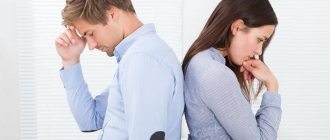Depression is quite common: according to WHO, more than 300 million people of different ages and gender suffer from it worldwide.
According to the American Psychiatric Association, this serious illness can take many forms, vary in severity among individuals, and co-occur with other conditions that cause similar symptoms, such as anxiety disorders.
Since the causes of depression are associated with disorders of the brain, it is useless to urge patients with depression to “pull themselves together” - its symptoms cannot be overcome by volitional effort, just as it is impossible to influence the functioning of the brain with volitional effort.
“Mood is our subjective experience, that is, what we can be aware of and about which we can give an account. Any psychological phenomenon is based on complex and multi-level processes that occur in our nervous system. In particular, neurochemical ones,” explains senior researcher at the laboratory of scientific foundations of psychotherapy, candidate of psychological sciences Maria Danina.
According to her, according to the monoamine theory, three different monoamine neurotransmitters contribute to depressive symptoms. Moreover, neurotransmitters do not “trigger” the disease on their own, but influence certain processes that, in fact, lead to depression.
Firstly, it is dopamine, which is involved in the motivation system. A lack of dopamine can lead to anhedonia—that is, the inability to experience pleasure.
Secondly, it is norepinephrine. It is involved in regulating our daily activities. Its deficiency is associated with psychomotor retardation (when a person begins to move and speak more slowly than usual).
And thirdly, serotonin. Which is involved in controlling the sensitivity of the pain system, suppresses pain signals and negative emotions.
A lack of serotonin leads to increased pain, negative emotions and anxiety. In addition, due to a lack of serotonin, obsessive states develop, associated with constantly recurring thoughts about the past and the reasons for one’s current condition, which are difficult to get rid of - psychiatrists call this rumination.
“In addition to reducing the level of neurotransmitters, other groups of biologically active substances, for example, glucocorticoids, can also contribute to depression,” notes Maria Danina. “For example, the level of the famous “stress hormone” cortisol also increases during depression - and this in turn leads to a lack of dopamine. Monoamine levels can be influenced by thyroid hormones and sex hormones: estrogen and progesterone.”
However, clinical depression can be triggered by many factors - for example, hereditary predisposition, low self-esteem, difficult life circumstances, severe stress and chronic diseases. And therefore, we cannot “place all the blame” only on disturbances in brain function, emphasizes Maria Danina.
Neurotransmitters and their effects depending on deficiency or excess
Directions for use
In many cases, these medications only need to be taken once a day, at bedtime. You may need to take them for several weeks before the condition begins to improve. Do not change the dose (take no less or more), or the regimen (take no more or less often), or stop taking your medication without talking to your doctor. Your doctor will help you choose the most appropriate medicine and dosage for you. To achieve the best treatment results, you need to carefully follow your doctor's instructions.
Consequences of taking antidepressants
13.09.2021
Antidepressant use is becoming increasingly common, becoming the third most commonly used drug after alcohol and tobacco.
Moreover, they are very easy to access. This increase in antidepressant is associated with longer life, so
more suffering due to loneliness, economic crisis, etc. However, many people use it as a shortcut to overcome any problems.
In addition, in many cases they are overprescribed to people who, having undergone psychotherapy , may feel better without medication.
Side effects of antidepressants
There are various types of antidepressants . Generally speaking, their effectiveness stems from the fact that they facilitate the transmission of certain
substances in the brain that are involved in the processing of pleasant sensations or interfere with the transmission of other substances that interfere with the occurrence of these sensations.
Like any other medicine, antidepressants have many side effects that depend on the person, dose, and type of antidepressant .
Central nervous system . At the brain , they can cause agitation, insomnia , or even some confusing images.
Autonomic nervous system . and impotence are often observed . Many people also experience dry mouth , nausea ,
blurred vision , urinary , constipation or dizziness .
The cardiovascular system. Hypertension and tachycardia are quite common.
Mental effects. In the first two weeks, there may be an increased risk of suicide due to increased brain activity. That's why antidepressants
it takes time to take effect. Additionally, they can also cause anxiety.
Other side effects. In some people, taking antidepressants has caused amenorrhea, allergic hypersensitivity, and hypoglycemia, among other things.
Side effects will be different for each drug and each person. There are several types of antidepressants , such as tricyclic antidepressants .
Long-term effects of antidepressants
One of the factors to consider when taking antidepressants is their withdrawal. They cause addiction in a person, which, when withdrawn,
may cause withdrawal symptoms. Therefore, it is very important that it is not removed suddenly. On the other hand, in the long run they
increase the risk of developing breast cancer , although they reduce the risk brain cancer . In addition, they can cause neurological damage, which may lead to
to memory impairment and the appearance of some symptoms similar to those of Parkinson's disease .
At the gastrointestinal level, they can cause irritable bowel syndrome or other digestive problems over time.
Likewise, the sexual problems we mentioned in the previous section may become more persistent and more difficult to resolve.
Is it possible to take antidepressants for the rest of your life?
All of these side effects make you wonder what would happen if a person had to take antidepressants for the rest of their life. The problem is
is that in many cases depression and its symptoms are chronic, so many people may rely on this medicine to carry on normal
life. In addition, in many cases, psychotherapy does not produce much results for these people, so medication is the only option.
Therefore, yes, in some cases, antidepressants can be taken throughout your life. These are people who should be carefully scrutinized and excluded.
any possibility of stopping medication without relapse, and for which psychotherapy be ineffective. Although they risk getting
the above-mentioned side effects, they do not always manifest themselves, and the alternative to their absence is chronic depression , due to which a person cannot
lead a normal life.
In these cases, it is important to strictly follow the doctor's . You should never change your dose or take other medicines without first consulting
with a psychiatrist, and, in addition, psychological support can facilitate adherence to medication. On the other hand, good habits and good
Social support also increases the effectiveness of the drug.
Published in Medicines Premium Clinic
Precautionary measures.
- Tricyclic antidepressants may have a calming effect, so you may feel drowsy or less alert than usual. Therefore, you should know how you react to these medications before driving or operating any machinery.
- These drugs may increase the effects of alcohol or other central nervous system depressants (medicines that depress the nervous system), which may cause serious side effects including severe drowsiness, memory problems, and loss of consciousness. While taking these medications, check with your doctor about your plans to drink alcohol or take any other medications.
- If you are pregnant, planning to become pregnant, or breastfeeding, tell your doctor before taking these medications
- Tell your doctor about allergies to any medications, as well as what medications prescribed or not prescribed by doctors you are taking
- tell your doctor if you have glaucoma, urinary retention, or heart disease
Etiology and pathogenesis
The therapeutic effect of tricyclic antidepressants is: increased serotonin levels, inhibition of monoamine reuptake at synapses, antagonism of postsynaptic serotonin receptors.
Effects and symptoms
Pharmacological properties of TCAs that provide clinical results in overdose:
· Inhibition of monoamine reuptake (norepinephrine, serotonin).
· Sympathomimetic effects: arrhythmia myoclonus, muscle rigidity and hyperreflexia.
· Anticholinergic effects. Main symptoms range from elation to delirium, hallucinations, slurred speech, ataxia, sedation and coma.
· Peripheral effects cause dilated pupils, blurred vision, tachycardia, decreased oral and bronchial secretions, dry skin, urinary retention, increased muscle tone and tremor.
· Inhibition of adrenergic receptors. Hypotension and reflex tachycardia.
· Miosis, but pupil dilation may also develop.
· Sodium and potassium blockade. Increased PR, QRS and QT intervals.
· GABA antagonistic effect.
· Reduced seizure threshold.
Benzodiazepines and barbiturates are potent GABA receptor antagonists and are the first choice in the treatment of TCA-induced seizures.
Acidosis aggravates poisoning by increasing the concentration of tricyclic antidepressants and the direct effect of arrhythmia.
Sinus tachycardia and extrasystoles are the first cardiac symptoms. Gradually, the central inhibitory and cardiotoxic effects will dominate with sedation, bradyarrhythmia and hypotension.
Pharmacokinetics
· Tricyclic antidepressants are lipophilic drugs that easily penetrate the blood-brain barrier.
· At therapeutic doses, peak plasma levels are achieved within 2-6 hours.
· Tissue levels of TCA are typically 10-100 times higher than plasma concentrations (1-2% of body TCA found in blood). This means that hemodialysis or increased diuresis has only a minor effect.
· The average half-life of tricyclic antidepressants is 24 hours (ranges from 6 to 36 hours), but can be extended to 72 hours by overdose.
· The therapeutic dose is usually 2-4 mg/kg body weight. Doses exceeding this may have toxic effects. Life-threatening toxicity is often observed after ingestion of >15-20 mg/kg body weight.
Predisposing factors for poisoning are suicide attempts in patients with depression or unintentional drug poisoning.
Possible side effects
Many patients experience side effects while taking tricyclic antidepressants. These phenomena usually occur at the beginning of treatment and often disappear within a few weeks. The most common side effects include drowsiness, dry mouth, dizziness, headache, trembling, sweating, urinary retention and constipation. These phenomena indicate that the medicine is working. Tell your doctor if you experience any of the above problems. To reduce them, the dose of the drug you are taking may be changed or a different antidepressant may be prescribed. Call your doctor right away if you experience severe or unusual symptoms. Despite the side effects, it is still worth continuing to take medications for the relief that you can get over time.
Sections / Articles on psychotherapy
Nootropics
Nootropics are drugs that have a positive effect on the functionality of the higher integrative parts of the brain. That is, they have a positive effect on mental abilities and increase the activity of cognitive functions. A person becomes more learnable, his memory processes and resistance to distress improve. There are several groups of nootropics:
- “true” nootropics, the action of which is concentrated on improving mnestic functions;
- group of neuroprotectors - the mnestic effect is secondary, the effect on the central nervous system is mixed (anticonvulsant, muscle relaxant, antihypoxic);
- primary action nootropics - directly affect nerve cells;
- secondary action - improve cerebral blood flow, microcirculation, have pronounced antiplatelet and antihypoxic effects;
- neurodynamic or neuroregulatory - primarily aimed at stimulating metabolic processes in nervous tissues, prescribed to patients with anoxia, ischemia, intoxication, and injury.
Nootropics affect the processes of metabolism and bioenergy metabolism in nervous tissue; they interact with the neurotransmitter sphere of the brain. Children are prescribed with caution, in small dosages.
Nootropics are not recommended for use during pregnancy and lactation, gastric ulcers, feverish conditions, problems with the liver and kidneys. Nootropics are not prescribed to patients with sensitivity to components or epilepsy. During use, it is recommended to undergo blood and urine tests in a timely manner to assess the results of the course of nootropics.
Literature:
- Pharmacology of antidepressants / I. A. Vinogradova, V. D. Yunash, S. V. Goranskaya, etc.; Ministry of Science and Higher Education of the Russian Federation, Federal State Budgetary Educational Institution of Higher Education "Petrozavodsk State University". — Petrozavodsk: PetrSU Publishing House, 2020. – 36 p.
- Psychotropic drugs: reference book. practicing physician / F. Bochner et al.; scientific ed. rus. ed. Yu. A. Alexandrovsky; lane English A. N. Redkin. - Moscow: Litterra Publishing House, 2006. - 292 p.
- A short reference book on psychopharmacology, pharmacotherapy and mental pathology / Kozlovsky, Vladimir Leonidovich. — St. Petersburg: SpetsLit, 2015
Withdrawal syndrome
Many people do not trust such medications because they do not know whether antidepressants are addictive and are afraid that they will have to be on pills for the rest of their lives. This occurs due to misunderstanding of their actions and failure to comply with doctor's instructions when canceling them. You should know that you cannot stop taking it on your own after feeling a little relief, this will lead to the return of depression. The medicine must be taken as a full course, from 4 to 9 months, sometimes longer.
If you abruptly stop taking the drug, the following symptoms appear:
anxiety;- headache and dizziness;
- fatigue,
- painful condition;
- muscle pain:
- sleep disorders;
- nausea;
- flu-like manifestations;
- tremor;
- paresthesia;
- nervousness;
- memory impairment;
- hallucinations.
Duration is from one to two weeks, after which all symptoms disappear . Therefore, the drug must be discontinued with a gradual dose reduction. Symptoms from each group of substances manifest differently, which leads to beliefs that there are antidepressants that cause addiction. Sometimes reducing the dosage does not relieve the withdrawal syndrome, which is accompanied by a long period of mild symptoms.
Content:
- Use of antidepressants.
- Impact on a person.
- Side effects.
- Withdrawal syndrome.
- Treatment.
Many people believe that antidepressants cause addiction, mistaking it for the withdrawal syndrome that can occur if therapy is abruptly stopped. If you take the medicine correctly and under the supervision of a doctor, then there will be no negative manifestations.
Impact on humans
When understanding the question of which antidepressants cause addiction, you should find out their effect on the body. The main effect is to increase the concentration of serotonin, dopamine, norepinephrine and other mediators to enhance their effect. This leads to the following improvements:
- mood improves;
- apathy passes;
- anxiety level decreases;
- emotional stress is relieved;
- mental activity increases;
- sleep and appetite are normalized.
Now there are many effective drugs that do not cause dependence on antidepressants. Based on the nature of their action, they are divided into three groups:
- stimulating (for lethargy and apathy);
- sedatives (for anxiety and agitation);
- stabilizing (for all manifestations).
They are prescribed based on which symptom is dominant in a person. It is not recommended to use medications from different groups at the same time due to the large number of side effects. The choice of drugs is individual, and it is not immediately possible to choose the appropriate option. All prescriptions must be made by a doctor, taking into account concomitant diseases, contraindications, and compatibility with other medications.
Peculiarities:
- You may gain weight while taking some medications for depression.
- It is difficult to immediately select the right option.
- The therapeutic effect does not appear immediately, at least after 2–3 weeks.
Incompatibility:
- You cannot combine antidepressants from different groups, as fatal serotonin syndrome may develop.
- When taken simultaneously with small amounts of alcohol, headaches and nausea may occur.
SSRI
Venlafaxine and duloxetine block the reuptake of both serotonin and norepinephrine, and both are substrates of CYP2D6.
Venlafaxine (dosage 75-300 mg per day, half-life - 5 hours, active metabolite - desmethylvenflaxine) is characterized by low bioavailability (less than 20%) when taken orally. At low dosages, it is able to inhibit the reuptake of serotonin, and at high doses, norepinephrine, which, however, does not in any way affect its antidepressant potential. Venlafaxine is also capable of partially inhibiting dopamine reuptake.
Duloxetine (dosage 30–90 mg per day) blocks the reuptake of both neurotransmitters equally. As you can already guess, acting only on the reuptake of neurotransmitters, selective inhibitors of this group do not have atropinergic and sedating effects, unlike tricyclic antidepressants. Sometimes patients begin to complain of difficulty urinating, sweating and impaired potency, but this rarely leads to refusal to take medications. These drugs are contraindicated for liver disease, severe hypertension, epilepsy and glaucoma.
What is meant by depression
Doctors have been familiar with it since the times of Ancient Greece and Egypt. Hippocrates described it as melancholy - a condition that is accompanied by anxiety, despondency, insomnia, refusal of food, and irritability. Most often, the cause is childhood trauma or severe, frequent stress in adulthood. There are many provoking factors: the death of a loved one, worsening living conditions, alcoholism, brain diseases. Such cases are referred to as psychogenic depression.
The second type is endogenous. The problem does not arise from major external shocks, but from internal causes. A person is constantly dissatisfied with himself and exposes himself to criticism. Many patients have panic attacks and are haunted by feelings of fear and anxiety.










